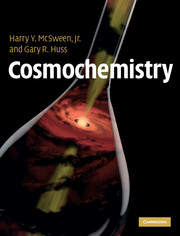Book contents
- Frontmatter
- Contents
- Preface
- 1 Introduction to cosmochemistry
- 2 Nuclides and elements: the building blocks of matter
- 3 Origin of the elements
- 4 Solar system and cosmic abundances: elements and isotopes
- 5 Presolar grains: a record of stellar nucleosynthesis and processes in interstellar space
- 6 Meteorites: a record of nebular and planetary processes
- 7 Cosmochemical and geochemical fractionations
- 8 Radioisotopes as chronometers
- 9 Chronology of the solar system from radioactive isotopes
- 10 The most volatile elements and compounds: organic matter, noble gases, and ices
- 11 Chemistry of anhydrous planetesimals
- 12 Chemistry of comets and other ice-bearing planetesimals
- 13 Geochemical exploration of planets: Moon and Mars as case studies
- 14 Cosmochemical models for the formation of the solar system
- Appendix: Some analytical techniques commonly used in cosmochemistry
- Index
- References
Appendix: Some analytical techniques commonly used in cosmochemistry
Published online by Cambridge University Press: 05 June 2012
- Frontmatter
- Contents
- Preface
- 1 Introduction to cosmochemistry
- 2 Nuclides and elements: the building blocks of matter
- 3 Origin of the elements
- 4 Solar system and cosmic abundances: elements and isotopes
- 5 Presolar grains: a record of stellar nucleosynthesis and processes in interstellar space
- 6 Meteorites: a record of nebular and planetary processes
- 7 Cosmochemical and geochemical fractionations
- 8 Radioisotopes as chronometers
- 9 Chronology of the solar system from radioactive isotopes
- 10 The most volatile elements and compounds: organic matter, noble gases, and ices
- 11 Chemistry of anhydrous planetesimals
- 12 Chemistry of comets and other ice-bearing planetesimals
- 13 Geochemical exploration of planets: Moon and Mars as case studies
- 14 Cosmochemical models for the formation of the solar system
- Appendix: Some analytical techniques commonly used in cosmochemistry
- Index
- References
Summary
The purpose of this appendix is to present some additional information on various analytical techniques and methods that are used in cosmochemistry. This is not an exhaustive review. The goal is to give the reader an idea of the techniques that are available and their capabilities and limitations. References to more detailed discussions are provided.
Chemical compositions of bulk samples
There are a variety of methods for determining the bulk chemical composition of a sample. Each has its strengths and weaknesses. The choice of which technique to use depends on the elements of interest, the methods to which you have access, and the funding that is available for the analysis, among other things. The minimum sample requirement of the technique is an important consideration, but it can be very misleading. The true minimum sample size is the size that adequately accounts for the chemical and mineralogical complexity of the sample.
Wet chemical analysis
The traditional method of determining the bulk chemical compositions of meteorites is by wet chemical analysis. The process is time consuming and requires skill and patience to obtain quality results. The best meteorite data were obtained by Hugo Wiik (e.g. Wiik, 1956) and Eugene Jarosewich (e.g. Jarosewich, 1990). The procedure for analyzing a chondrite can be summarized as follows. A sample is first crushed and divided into two fractions by passing it through a 100-mesh sieve. The coarse fraction is primarily metal, while the fine fraction consists primarily of silicate.
Information
- Type
- Chapter
- Information
- Cosmochemistry , pp. 518 - 542Publisher: Cambridge University PressPrint publication year: 2010
